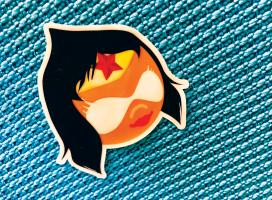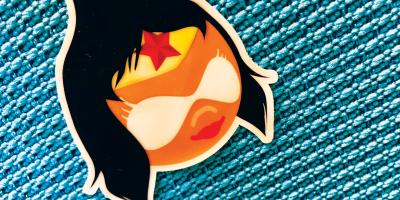The Women of the Drupal Community: Cainaru

Collection :
Name: Natalie Cainaru
Drupal.org ID: cainaru
Location: Potsdam, New York
Job Title: Drupal Developer at Acquia
One of the greatest things about Drupal is that everyone’s Drupal journey looks different. It doesn’t matter if you work on open source as a fun hobby or a full-time career, the Drupal community welcomes everyone with a passion for building web experiences, and gives us a collective purpose to be part of something incredible. In this month’s Women of Drupal blog, we had the pleasure of talking to Natalie Cainaru, Drupal Developer at Acquia, about her passion for web development and design. Natalie shares some of her biggest accomplishments building brand new Drupal 7 and 8 sites for major higher ed institutions, and explains the sense of pride and endless curiosity that keeps her passionate about the open source and Drupal communities.
Keep reading to see how she found her place in tech and what she’s most excited about for the future of Drupal 9. As Natalie knows well, contributing to Drupal and open source and making something out of nothing can feel as rewarding as climbing to the top of Mt. Everest.
How did you get your start in tech?
Honestly, it’s a long story. Being a child of the 90s, I had to help family members remove malware and hopefully prevent such incidents. That involved tons of browsing the web for answers, so over time I noticed the significance of web content strategy — what content was easy to digest, what was easy to find, what was structured logically, what seemed to make sense for a site’s audience, what was visually appealing, what was not visually distracting/overwhelming, etc.. That sparked my gravitation towards forms of expression via web development and design throughout high school. MySpace, LiveJournal and Xanga were the craze at the time. So there were tons of tutorials that provided decent starting points with HTML and CSS.
At the same time, web development and design weren’t discussed as something viable career-wise when I was in high school (particularly for those of us who weren’t strong with mathematics), so creating custom themes or layouts using HTML and CSS for friends who had blogs or just making very simple static sites on random free domains remained a hobby.
During my undergraduate career at St. Lawrence University, I tried majoring in neuroscience, but the intense math components put me in a different direction with a major in government-Asian studies and a minor in philosophy. In the meantime, during my sophomore year I began working with the university’s IT department’s Helpdesk, which is where I finally realized I could pursue web development as something beyond a hobby, even as someone who wasn’t a Computer Science or Mathematics major. From that point onward, I sought formal opportunities to build upon and solidify my self-taught knowledge of HTML and CSS and passion for making web content user friendly.
I ended up interning with the New York Six Liberal Arts Consortium’s Instructional Technology Apprenticeship Program where I did a project with the university’s learning management system, Sakai, and completed a Masters of Science in Education in Educational Technologies, and then working as a developer in Drupal 7 and Drupal 8 for St. Lawrence University and other universities.
How did you first discover Drupal?
During my sophomore year, the IT department I worked for was in the process of building several Drupal 7 websites to eventually replace a handful of Drupal 5 and Drupal 6 sites. Some recent graduates who had worked at the IT Helpdesk during my first year with the department were involved in the development of some of those sites as part of internships for their Masters programs and would occasionally reach out to Helpdesk workers to webforms, permissions for creating or viewing content, accessing certain views and other features. I thought it was really cool and wanted to learn more about how it worked. I knew it wasn’t just something made up of just static HTML files and CSS because that would be a pain to maintain. Eventually, when asked to do some more testing and provide feedback, I told them “Hey, this is cool… what is it made of and how does it work? How does a person build something like this, or at least get started building something like this? Is this something I can make on my own and tinker with?”
One of them took the time to walk me through tinkering with contrib modules on https://simplytest.me/, setting up a local Drupal 7 sandbox using the free version of MAMP, and pointing me towards some introductory documentation on drupal.org. I’ll be honest, I didn’t remember the exact steps for setting up additional local sandboxes with MAMP and had trouble finding easy-to-follow documentation afterward, so I eventually shifted gears to using Acquia Dev Desktop 2 which allowed me to setup a whole slew of local sandboxes to practice and learn with. Acquia Dev Desktop 2 will always have a special place in my heart for helping me!
Ultimately though, it was the ability to create a system to facilitate organized, structured content that hooked me into Drupal.
What Drupal function, project or contribution are you working on and/or most proud of?
This is a hard one! Right now much of my Drupal work is custom code for clients so I probably can’t get much into specifics, but lately I’ve been contributing patches back to the Drupal community for contrib modules that we are using on current projects. This is important to me because it helps sustain the open source code for the community, especially for educational institutions or non-profit organizations that use Drupal and rely primarily on contrib code. It also helps hobbyists who might be starting out like me, too.
But, probably the most memorable project thus far was one from my life before Acquia where I rebuilt https://digital.stlawu.edu/ in Drupal 8 over a span of 2 weeks. We had to have the site ready in time for the launch of a university fundraising campaign, so time was tight and it was primarily me setting up the site’s architecture, theme, etc. because the university’s main web developer was tied up with other projects. I was excited for this challenge for multiple reasons: it gave me the opportunity to utilize what I had practiced and learned regarding our webhost’s recommended Composer/GitHub/CircleCI workflow in the months prior, I could finally leverage solutions that were concocted within my plethora of local sandbox experiments and Acquia Spec Tool Spreadsheets to develop and improve the new site’s content structure, and gave me the opportunity to create a Bootstrap-based sub-theme using the university’s web brand and visual treatments.
What are some challenges you've faced, technically or career-wise?
As someone who never excelled in mathematics, I had to balance having a finite amount of funding for education that depended on academic performance. So, when it came to changing my major, I felt somewhat disincentivized from switching to a major such as Computer Science due to the financial and academic risks. I didn’t really think there was a viable career available for me in tech at that point, mostly because I was pretty much convinced that you must be a Computer Science major in order to get into tech.
A lot of Computer Science focuses on the math-heavy side of programming, when in practice it’s only a small part of practical development, such as with Drupal, that often benefits from an interdisciplinary approach incorporating concepts from psychology, communications, philosophy (particularly logic and reasoning), sociology, etc. Luckily, I had that “aha!” moment and embraced web development despite not being a Computer Science major, but sometimes I wish I had that realization much earlier on in my life.
At the moment, I feel like my biggest challenge is dealing with Imposter Syndrome. There are definitely blind spots in my knowledge, and sometimes I might not know how to even begin to ask for help on something within my blind spots that gets me stuck. Lately, when finding myself in such a scenario, I’ve been trying to tell myself that it is okay to reach out and say, “I am stuck. This is not going as planned, and I don’t know why.”
What inspires you? What keeps you passionate about your work?
It’s a combination of things. For one thing, the energy of the Drupal community definitely helps fuel my drive. Learning from others and seeing the vast number of creative projects that come from the community in itself is inspiring. Also, it’s hard not to be enthusiastic about something like Organic Groups in Drupal 7 or Layout Builder in Drupal 8 when you’re surrounded by folks who know about and can relate to what you’re talking about.
Secondly, it ties into things that I find intrinsically rewarding. Some people find it intrinsically rewarding to climb Mount Everest. For whatever reason, I find it intrinsically rewarding to build websites using Drupal and overcome any challenges I run into along the way. Working with Drupal, especially early on, I’d find my flow getting absorbed into working with fields, content types, views, theming and sub-theming, etc. and truly enjoying it. It was the right balance between skill and challenge of the tasks at hand that helped facilitate that early experience, which has stuck with me to this day and continues to propel me forward.
What are some other aspects of the Drupal community that you're involved in?
I enjoy attending conferences and meetups to learn more about what’s new in Drupal and cool new projects out there that are using it, how others are contributing to the Drupal project, how others are using it, and challenges others have encountered on their own projects and how they overcame them.
How do you think we can help empower women in tech and work toward better gender inclusion?
I think it is important to show the wider world of tech opportunities that are available, perhaps through outreach efforts to women starting in K-12 and beyond. This might help dispel the notion that the only careers in tech are computer scientists and little beyond that. Also, it might help some women realize earlier on that their hobbies of web development, graphic design, video editing, etc. can segue into a career path in tech. Building accessible opportunities and time to “play” with room for failure/trial-and-error—through maker spaces, clubs, meetups, or other similar groups — would also help facilitate exploration and discovery as well as hopefully establish a support system of people to reach out to with questions. I know for myself, having the peers from the IT department to reach out to with Drupal-related questions (even the seemingly “stupid questions”) early on made a huge difference for me. Along a similar vein, providing more documentation and tutorials (or more thorough documentation and tutorials in some instances) to help beginners, particularly those who might be learning on their own and might not have more experienced folks to reach out to with questions. I think a combination of all those efforts will help us work towards better gender inclusion.
What does the future of Drupal look like in your opinion? More adoption, new features, any major changes?
It’s hard to tell exactly what the future looks like for Drupal, but I’m excited regardless. I think we might see more adoption at the enterprise-level, which is great, but I’m admittedly concerned we might see less adoption at smaller organizational levels or by hobbyists also. As for new features, I’m definitely looking forward to the Olivero theme, which will be a new front-end theme shipping with Drupal 9.1.0+, which has a strong focus on WCAG AA accessibility conformance and a modern design. The typography for the theme is absolutely gorgeous in my opinion.
What advice would you give your younger self or someone who is just starting out?
Continue to be curious and persistent. Do not be afraid to ask those questions that you think might sound stupid because this is how we learn and improve. Also, do not be afraid of failure; sometimes the best learning takes place through seeing how something went wrong. Be flexible to change the course of your journey if necessary.
---
If you are also eager to see what’s next in Drupal 9, check out our updated: Ultimate Guide to Drupal 9.

